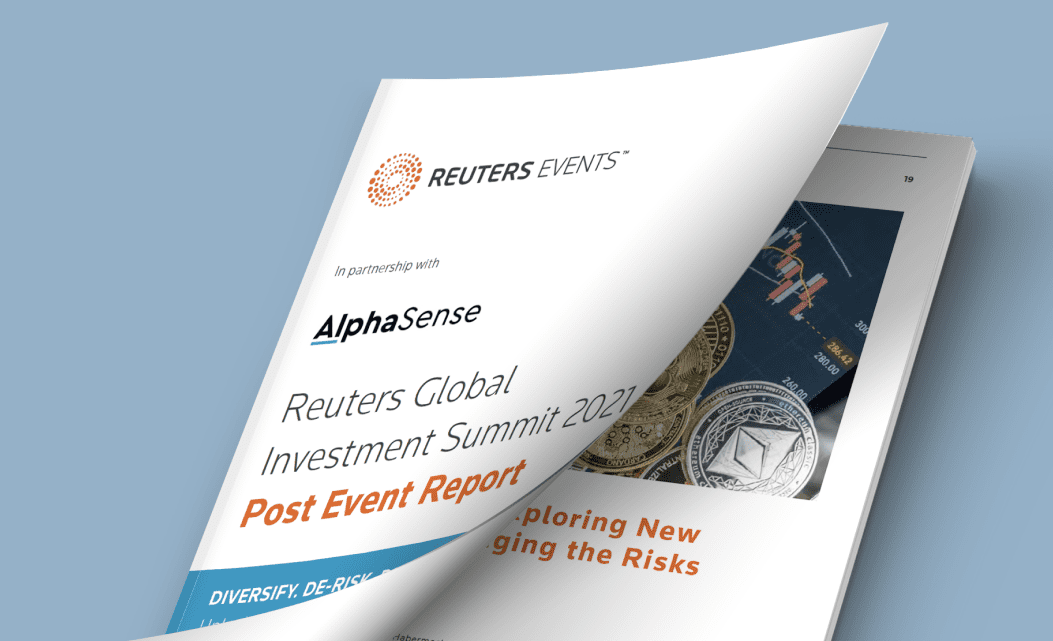The annual Reuters Investment Summit, held in December, attracted over 3000 attendees in two days, as a distinguished and authoritative lineup of speakers from leading asset managers and solution providers addressed the investment outlook for 2022.
A panel of CIOs from major investment firms and financial institutions set the scene, highlighting the key trends and drivers that will shape markets in 2022, featured in their post-event report. As we emerge from the pandemic and the global economy reopens, adapting to the new paradigm will present both challenges and opportunities for investors.
What other trends were announced at the event? Asset management is not just about portfolios, but people and products as well. On the latter, the key issue for asset managers will be how to modernize and develop technological capabilities, while on the human resources side, the main focus is on how to enhance long-term value creation through initiatives that can build a more diverse and inclusive workplace.
Aside from the economic and market outlook, the transition to a more sustainable future, particularly in view of the urgent need to address climate change, will continue to drive both environmental and social changes and present challenges for both investors and regulators. Notably, how to move towards a more circular economy and evolve ESG criteria so that asset managers are better placed to meet socially responsible investment objectives.
In an exclusive interview with Jack Kokko, AlphaSense CEO & Founder, featured in this report, he discusses how emerging technologies are affecting the investment industry and decision-making, as well as the big moments and trends to navigate this year.
What are some key trends that will impact the investment management industry over the next year?
Jack: ESG is a true megatrend. Fund flows are going heavily in the direction of sustainable investing and that is driving behavior for investment managers; they are launching funds and building teams to focus on ESG investing so they can meet and capitalize on the demand. The broader societal concerns around sustainability are causing savers and capital allocators to no longer look at just investment returns as the sole driver of where to put their money— they are willing to sacrifice some return to make sure they are investing in a sustainable way. This drives investment managers to allocate capital to companies that are doing a better job on sustainability, which, in turn, drives behavior for companies. Looking at earnings calls in our own platform at AlphaSense, we see executives talking more about ESG and sustainability topics than they ever have before.
Adoption of AI-based technology is accelerating. Technological innovations, particularly AI-based technologies, are transforming the competitiveness and internal capabilities of investment firms—more simply, they are empowering firms to do things they couldn’t do before. Being smart about leveraging AI is proving to be a key differentiating factor for leading investment firms to attract capital, drive investment outperformance, enhance operational efficiency, manage risk, and more.
From the AlphaSense vantage point, we are seeing major adoption for AI in making investment teams smarter and more efficient. I started out my career as an analyst at Morgan Stanley and experienced the inefficient and unreliable process of finding necessary data and insights. I was constantly digging through documents manually and from multiple, disparate sources. The solution we built to solve this problem was AI-based technology, which aggregates and organizes this information to help analysts have all the relevant data points reliably at their fingertips. This way, they can focus their brain power on connecting the dots rather than manually looking for them. These benefits are what’s driving Wall Street to technology and AI platforms to help empower their people to reallocate their time from manual work to higher-level analysis and thinking.
Another key trend is workplace culture and talent management. The pandemic is still building its legacy with the Great Resignation and the growing challenge of recruiting talent. Investment banks are facing challenges in recruiting analysts when tedious manual work doesn’t come coupled with the face time and exposure to top executives at their firms or on the client side. Unlike in the past, financial firms are now really looking to focus on offering their analysts more meaningful work, and also making that work more efficient through management practices and better technology solutions that are well-suited to the new world of remote work.
Digital transformation continues to pick up pace. While digital disruption is not new to the investment industry, COVID has accelerated the full move to digital. J.P. Morgan recently announced that they are hiring 4,000 new employees specializing in digital skills like cloud technologies, big data, and cybersecurity. More and more firms are investing in digital transformation with a mass migration to the cloud and major enhancements in data analytics.
What are likely to be the big moments to navigate for policy, politics or corporate trends in 2022?
Jack: To name a few that top analysts are focusing on: the tightening of monetary policies and its effect on inflation, the demographic revolution of Gen Z, the race to net-zero emissions, the increasing rivalry between America and China, and imminent political unrest post-pandemic. While last year was focused primarily on supply chain disruptions, leading analysts are expecting that we’ll see the easing of supply chain restraints, which will finally meet the skyrocketing demand in the U.S.
How will the adoption of ESG and sustainable investing continue to develop?
Jack: Sustainable investing has quickly become the top buy-side investment trend, driven by major fund flows in the direction of ESG. This drives investment firms to build dedicated efforts around ESG, and given investor expectations and focus, corporates are addressing ESG topics more than ever.
We recently partnered on a report with our customer, SAP, who used the AlphaSense platform to analyze C-Suite sentiment and focus around sustainability and ESG topics. They found that sustainability mentions in earnings transcripts went up 44% in 2021 since 2018, and up 30% overall year-over-year, showing significant acceleration of focus. With heavy investor interest in ESG, C-Suite leaders are feeling the pressure to deliver meaningful ESG strategies and this pressure will only grow this year.
How is emerging technology impacting asset managers, from both a business perspective and in terms of investment decision-making?
Jack: Despite the fact that the asset management industry grew to over $100 trillion through the pandemic, profitability of fund managers is under pressure. Not only have leading firms gotten bigger across all pockets of asset management, capital raising is strong and there is an abundance of dry-powder capital—but there is a scarcity of differentiated places to invest it. Thus, the competition for good ideas and investments has never been fiercer.
To stay competitive, managers are more than ever looking for an edge by embracing new technology to help them identify and validate good ideas faster, and unlock agility and scalability in their decision-making and operational processes. From the AlphaSense perspective, we see the market really embracing AI technology in building this competitive edge; technology reduces an investment analyst’s research time significantly, enables proactive risk management, and accelerates the discovery of that next big idea in order to act on it before others do.
Learn more about the key trends and drivers shaping markets in 2022 in the full report, Reuters Global Investment Summit 2021 Post Event Report.




